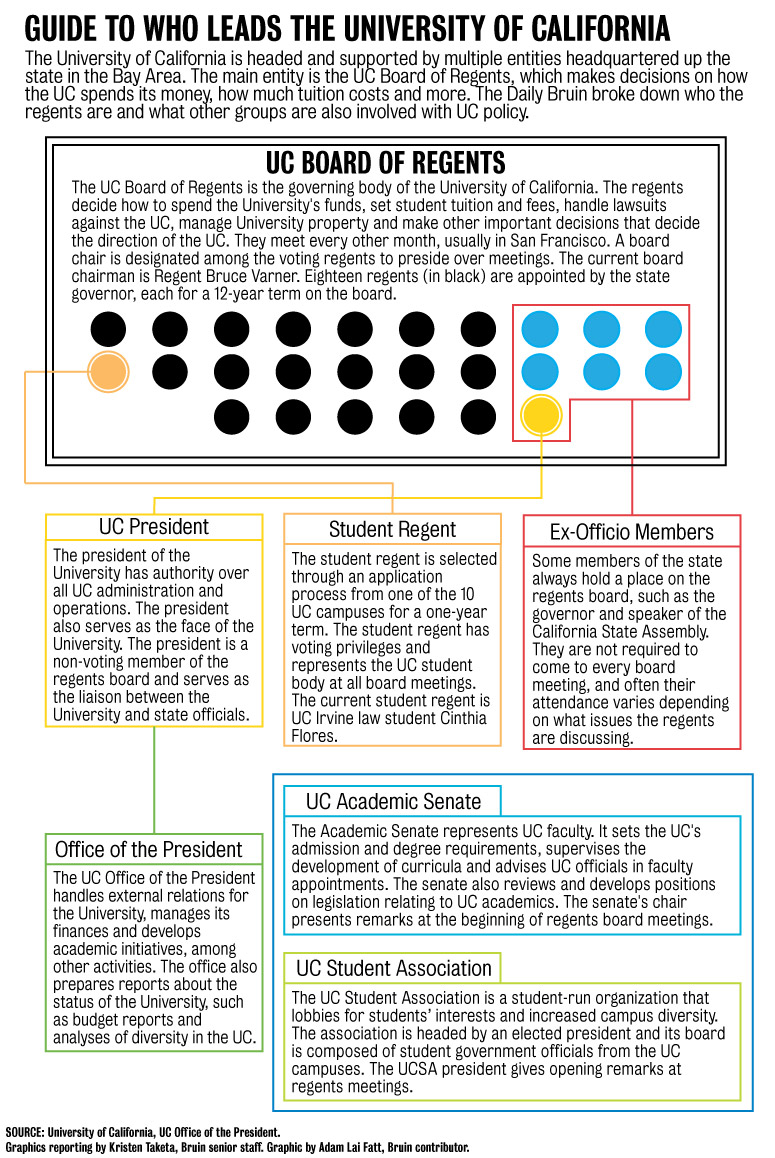The student regent represents all 230,000 students in the University of California system on the UC Board of Regents. The 26-person group governs the University, decides how to spend its money, sets tuition levels and makes other important decisions that affect the UC.
Student regents are the sole student voice on the UC Board of Regents. They are selected through an application process and serve a one-year term.
This year’s student regent is UC Irvine law student and UCLA alumna Cinthia Flores. The Daily Bruin’s Kristen Taketa asked her how she plans to serve as the student regent, what her goals are for the upcoming year and what new students should know about the UC regents.
Daily Bruin: What will be the most important issue affecting students in the next year?
Cinthia Flores: I think the University is in a unique position. For the first time, we’re not expecting (tuition increases), at least at the undergraduate level, for 2013-2014. … One of the primary issues that has impacted student lives, which is student fee increases, is still going to be a very important issue, but it’s not going to (dominate) the conversations this upcoming year. That is going to provide students with the opportunity to be on the offense.
Students haven’t been on the offense for a very long time because we’ve been reacting to budget cuts, and fee increases, and cuts to higher education overall. And so I think that this is actually a time for students to really take advantage of people like myself and request that we work on issues that they care about, not issues that we’re reacting to.
One of the biggest things that we’re actually concerned about is UC diversity and campus climate issues. I am a student at UC Irvine and just this past quarter we had two very egregious incidents where a community at UC Irvine was explicitly attacked. I think that … signals we’re still not in a place at the University of California where we can really appreciate and understand the interconnectedness and the value of diverse students at the University.
DB: The UC Board of Regents just appointed the next president of the UC, Secretary of Homeland Security Janet Napolitano. Some students are not happy with the choice because of Napolitano’s past immigration policies, and you voted against her appointment because of these students’ concerns. Now that she is officially appointed, however, what do you hope to see in her leadership as the next UC president?
CF: She’s obviously a nontraditional nominee in a lot of ways, and she’s a traditional noimnee in a lot of ways as well. I think she’s going to be great at administering and managing the UC. I think that she is going to be able to provide a different perspective of the UC overall and she is going to be able to represent the University of California in the political realm both on a statewide and federal level. What I would like for her to incorporate into her leadership skills is an understanding and a true commitment to working with students and recognizing that students are a critical component of her success, a critical component of UC success, and really prioritizing and developing a partnership with students.
DB: How will you use the position of student regent in a manner different from your predecessors?
CF: I think the position is a very unique position, and in a lot of ways we have to be able to perform very basic duties. We have to be able to attend the meetings, be able to speak about student issues and present the student perspective on an array of issues. The unique aspect that I’m bringing to the job is that I want to have a hands-on approach. I don’t want to just be responding to issues, I want to be presenting solutions. I think that’s going to be one of the primary distinctions between my term as a student regent and previous terms of student regents. I want to be proactive and present solutions rather than just react to issues that are happening at the UC.
DB: What is one thing new students should know about the UC and about the regents?
CF: I would, at the very minimum, like them to feel that (UC regents) are the people that are responsible to represent (their) interests. (Students) should feel as comfortable requesting and demanding responses to their issues as they are when they ask their student government or when they ask their university administrators. If I were a new student, I think I would like to be familiar with the governing structure of the Board of Regents. But also (students should know) that they have an ally on the board and that person is the student regent. And I’m committed to working toward whatever issues students want to work on.
(The regents board) is the primary method of ensuring that the University is able to meet the needs of students. I think that students are at a significant disadvantage if they aren’t aware of the board, because if they are unaware of the board, the board … cannot meet their needs.
